The faces of Maduro’s
“protector” at the border
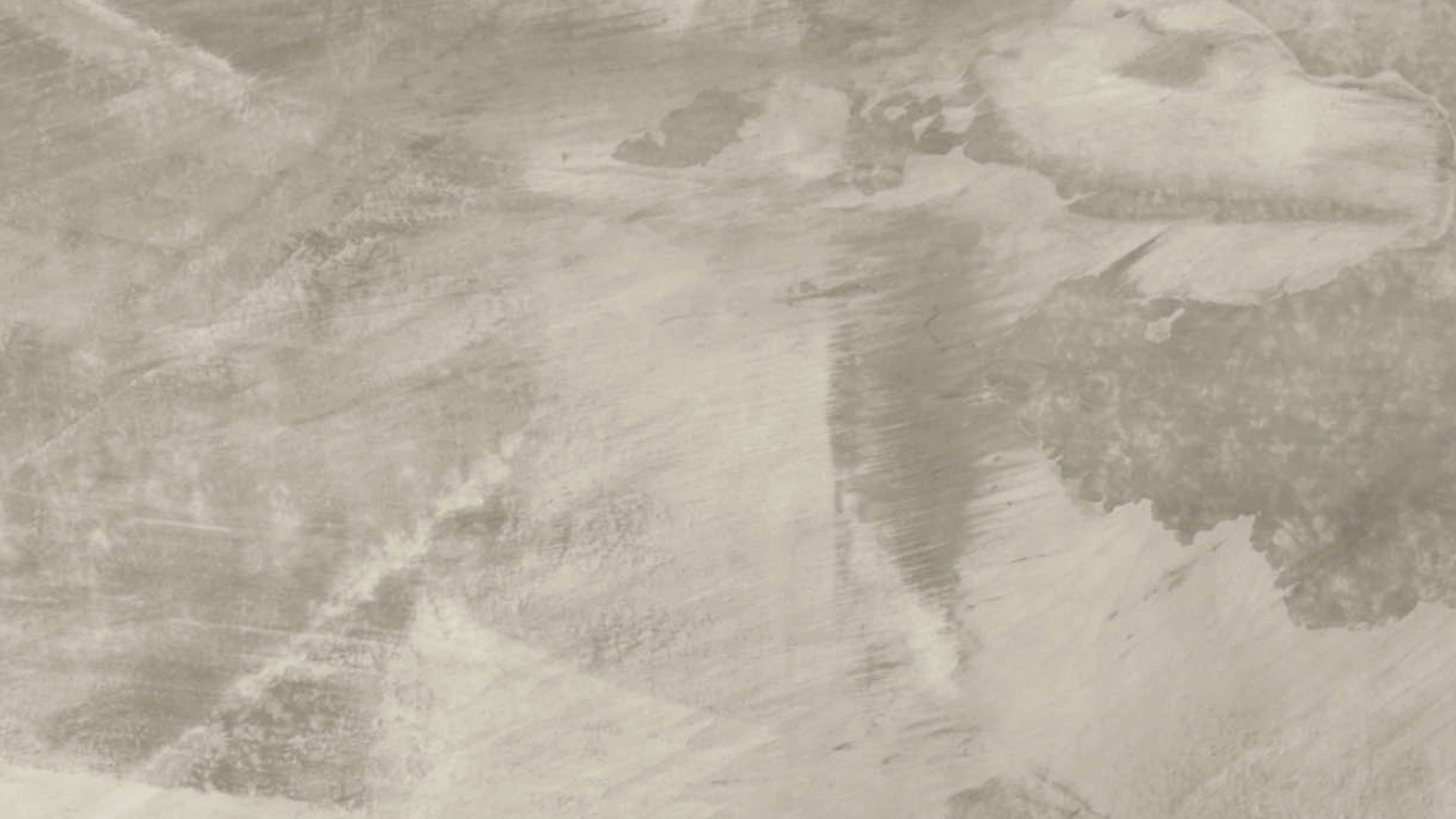
.
Freddy Bernal is one of the few Hugo Chávez men who still have support from Nicolás Maduro. He imposed him in 2017 as Táchira “protector”, a position created by Chavism to keep political control in the states where it lost the elections. From a policeman who participated in a coup he moved to politician and being a civil servant, he was pointed out for supposedly having relations with drug trafficking and was sanctioned for violating human rights. Despite the accusations, he now has the opportunity to be a governor.
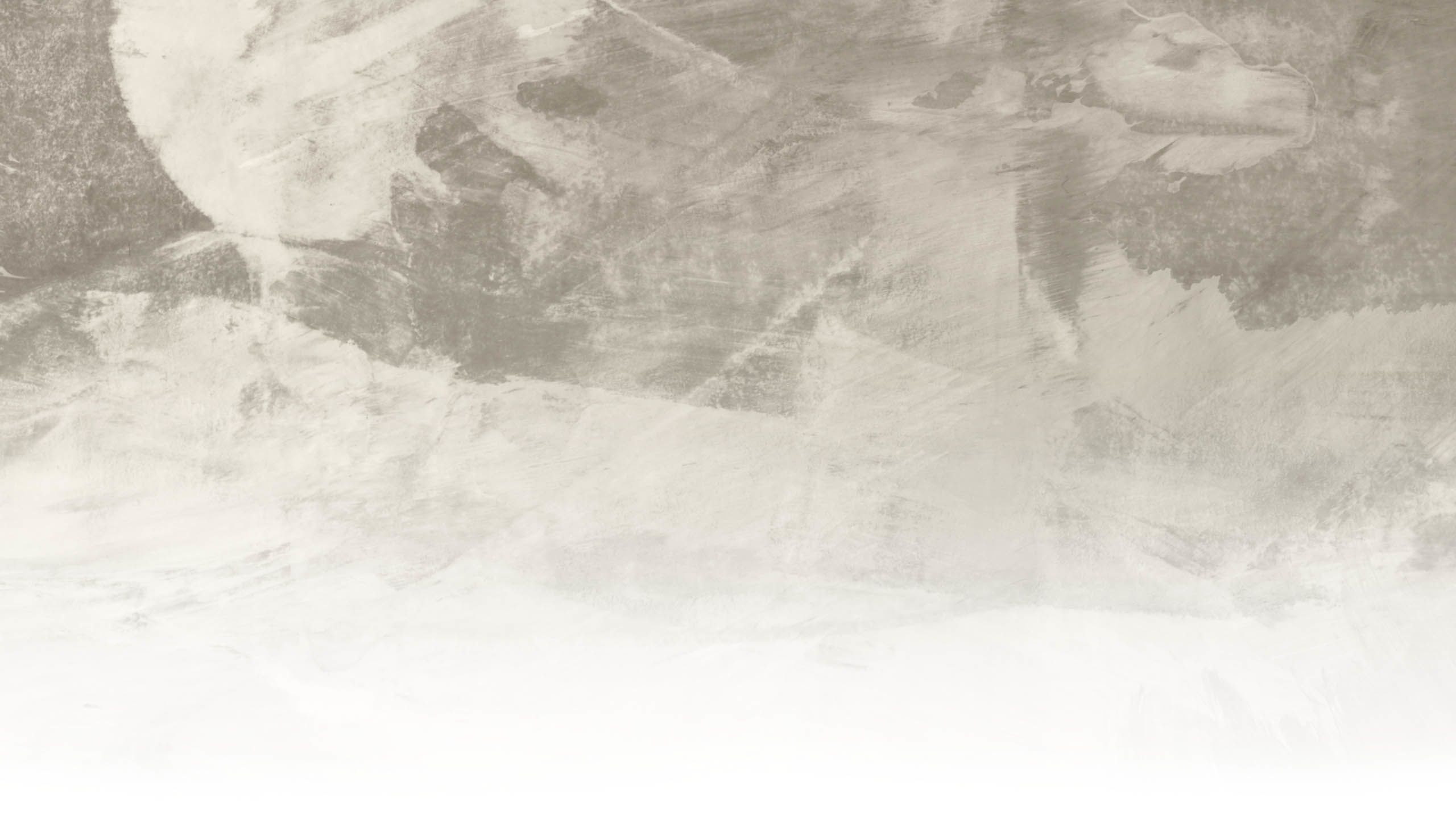

The Andean state of Táchira, a region bordering with Colombia, has been ruled for four years by a sort of an “alternate governor”: Freddy Bernal. Appointed by President Nicolás Maduro to be “protector” in the region, he has been related to controversial personal episodes and has been a key player in the Chavism history in Venezuela. His experience with crime control has not been enough to stop irregularities at the border and, on the contrary, he has been accused of managing public funds at his discretion, having liaisons with irregular Colombian groups, and creating a parallel customs office.
Bernal was a policeman when he participated in Hugo Chávez’s coup in 1992 and was a bodyguard for Violeta Barrios de Chamorro when she was president of Nicaragua. Over the years, he added positions as a constituent, mayor of Caracas, deputy, and minister to his resume thanks to Chavism. His name was included in US’s Clinton List for alleged nexus with drug trafficking together with FARC and is in on all the lists of Chavistas sanctioned due to human rights violations.
This is the path of Bernal, Maduro’s “protector” at the border and his candidate for Táchira governor oncoming regional elections on November 21. The state is still in the hands of the dissidents despite the Chavism hegemony in the rest of the country. This role, non-existent in the Venezuelan laws, was given to him in January 2018, after the election victory of the dissident Laidy Gómez as this state’s governor.
“Táchira is a war zone, one of the most die-hard territories to recognize the Bolivarian government’s authority. President Maduro asked me to make Táchira a peace border, and we are doing so. In two years we have taken back control of the territory, and this is something the right-wing can’t stand”, Bernal himself got to say in 2020 in an interview for the América Latina en Movimiento. website.
Since 2015, Maduro closed the border with Colombia, after two thousand Venezuelan soldiers were injured in confrontations with criminal gangs. The bridges connecting the two countries from Táchira have been the scene of disputes. A year after that closure, the pedestrian crossing was allowed until February 2019 when the total crossing was prohibited again after disputes between Juan Guaidó’s interim government and Maduro’s administration who blocked the way for passing humanitarian aid to Venezuela.
In June 2021, Colombia authorized opening the border, but it depended on the Venezuelan authorities who kept blocking the road, leaving soldiers responsible for letting people with special health conditions cross. In October this year, Caracas announced the authorization for commercial transit, but when this report was published, the restrictions for freight and private were still in force. This situation affected and keeps affecting, citizens who have been forced to cross through irregular paths called “trails”, as well used for illegal transportation of goods and fuel.
For some time, some sort of parallel customs resulted in the loss of revenue to the national Treasury. Both, the governor and sources consulted for this report presented by the Alianza Rebelde Investiga (ARI) conformed by El Pitazo, Runrunes y TalCual together with the journalistic platform CONNECTAS, disclosed that from the “protectorate” authorizations for the illegal passing of goods through the trails are handed over.
Six months after being appointed as “protector”, Bernal was designated as president for Corpoandes (Corporación de Los Andes), an agency created in 1964 that grants him the right to manage public funds distribute them among the states of Táchira, Mérida, and Trujillo. From the beginning, as one of the sources consulted for this investigation mentioned, took fuel and domestic gas cylinders distribution unto himself as well as everything related to the border. “The most sensitive fields, with greater shortfalls, but in which more money moves and now, currencies, especially Colombian peso. For the control of all the areas they have the complete support of the Armed Force, they work hand-in-hand, or as they say, it is a civic-military union”, said the informant on the condition of anonymity.
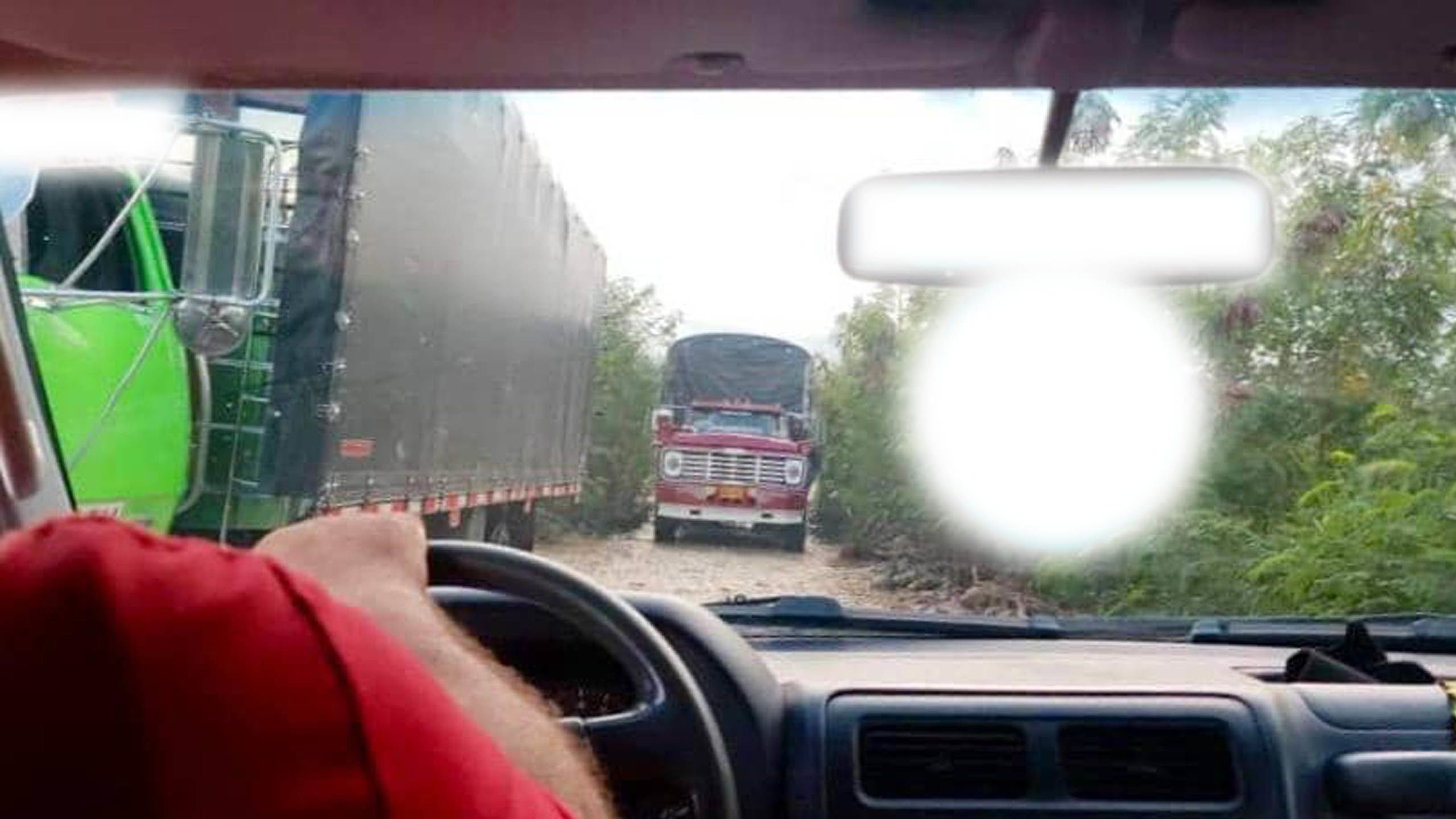
Crossing through the trails at the border, goods transportation was evidenced | ARI
Crossing through the trails at the border, goods transportation was evidenced | ARI
He is related to the so-called “protectorate codes” which are issued by the agency managed by Bernal. “The codes mean an authorization to illegally move goods through the trails and are given to the regime’s”, assured an entrepreneur in the region who requested not to be identified.
According to the inquiries for this report, people asking for the “protectorate code” first go to the offices of the tax-collecting bodies (Seniat) at the Major Customs Office from San Antonio del Táchira and pay the fee to get a tax clearance form. This amount corresponds to 3% of the total cost of the goods imported when the right thing to do is to fully file it. Consequently, financial damage to the nation is caused.
One of the sources consulted explained with papers in hand (code and tax clearance form) that after this step “the go to a specific trail used for such purpose, where they wait for the Colombian freight cars with the goods to transship them to trailers with Venezuelan plates and later move them through the national territory”.
To get the code there is another fee. “It varies depending on the extent of the friendship between the owner of the goods and the authorities, especially with the protectorate and the military tops”. The source assured that between 5% and 8% of the real cost of the goods is paid per operation, payable in American dollars or Colombian pesos and cash.
“During the operation at the trails customs servants, soldiers, Táchira protectorate and irregular groups take part. Each one assuring his/her share”, stated another entrepreneur consulted, who requested to remain anonymous for safety issues.
Governor Gómez confirmed with the Táchira protectorate, several illegal businesses were established: good from Colombia enter using the codes given by the protectorate and it is managed through a Telegram group, setting it as a sort of parallel customs office as a percentage for entering the goods through the trails is paid.
“This type of trading operation is completely illegal and is evading taxation. It produces wealth that is not going to the region’s needs but to individual gain of the civil servants who have no formal obligations with the State. The most critical thing is that there is an alliance between the named protectorate and the Venezuelan Armed Forces that must guarantee sovereignty in the more than 52 trails at the Colombian-Venezuelan border”, said the governor.
V.I.P. trails
Since the border was closed, crossing through trails is the most common way to enter and exit Venezuela. These are steep paths, conditioned with basic bridges built from wood panels and Sacks filled with granular material to avoid them to sink into the waters of the Táchira River. In several of these paths, a “contribution” is paid depending on the cargo transported.
In a journey taken through one of these trails for this investigation, it was established that these irregular paths are watched over by soldiers from the Venezuelan army and the National Guard (NG). They are also guarded and controlled by armed civilians who are part of criminal gangs such El Tren de Aragua and the Ejército de Liberación Nacional (ELN) and shamelessly identify themselves as so.
Such paths are well-traveled by inhabitants of bordering municipalities and the named “hikers”, low-income migrants who flee afoot from the crisis that burdens Venezuelans. In contrast, one of the services that have emerged to pass the border is the “V.I.P. trails”, a service that is “more comfortable and safer than a door-to-door service”, which is offered for higher costs.
To cross the 48-kilometer way that goes from the Tachiran capital of San Cristóbal to the Juan Frío area in Colombia, 400.000 Colombian pesos are paid, 108 dollars, depending on the exchange rate of the day. One pays 40.000 pesos more per bag, amounting to about 11 dollars.
A man 42 years old using an NG’s field uniform led the journey carrying his service weapon and calling himself “Sergeant Suárez”. The officer informed that the crossing would be through the Rubio-San Antonio way, as “there is less trouble, and there are fewer checkpoints”.
Suárez saluted with his left hand every civil servant at the checkpoints, and handed out a note of 10.000 Colombian pesos, amounting to 3,7 dollars. “What’s up, bro”, he said to one of the soldiers. “No newness, Sergeant”, answered the man as he immediately put the note in the pants’ pocket.
Approaching San Antonio, between las Dantas and Peracal, in the curve, five cars were queueing because a trailer transporting goods had an accident on the road. Several soldiers watching over had to transship the goods to other two smaller vehicles. It included milk, pasta, rice, cornflour, sugar, canned food, toilet paper, detergents, bleach, among others, all being from Colombian brands.
How did all these goods get to this area if the border is closed? Question came. Soldiers said that this cargo belonged to someone having the “protectorate code”.
Two trails are used to pass products that are authorized by the “protector’s” office; both are located on either side of Simón Bolívar international bridge: Llano Jorge area (former La Ponderosa hacienda) and on the way to El Palotal Parrish.
According to Governor Gómez, smuggling through these irregular paths makes Bernal’s parallel government receive 3 million dollars weekly (12 million dollars monthly). She also highlighted the severe economic loss to the bordering state by stating that in the last two years, more than 288 million dollars from customs collection have not been collected. These could have been invested in public works. These figures contrast with the resources that the governor’s office receives, among them, the monthly 20 thousand dollars for public health, from which 252 clinics and 10 hospitals depend, and having the state’s main medical center, the Hospital de San Cristóbal in need of 1 million dollars every month to operate.
“This situation is not a secret for anyone. Traders and agriculture producers themselves come to my office to show their concern due to payments that have no tax and customs support that must be presented at the so-called protectorate to bring goods or raw material from Colombia”, suggested Gómez.
Meanwhile, Gaby Arellano, a dissident deputy in exile, denounced that the “protectorate” charges between 5 and 25 dollars to allow crossing between the two countries through the irregular trails.
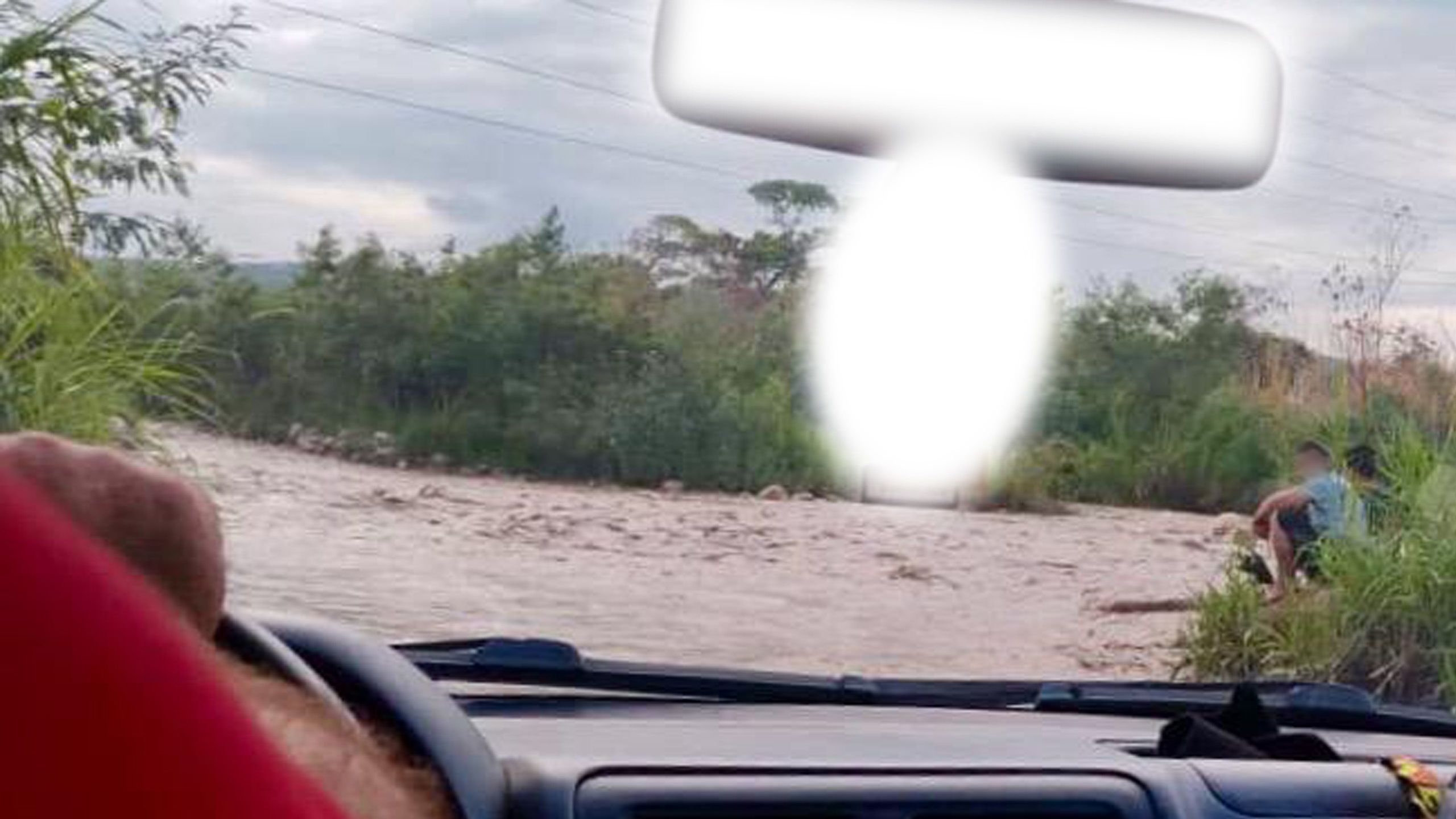
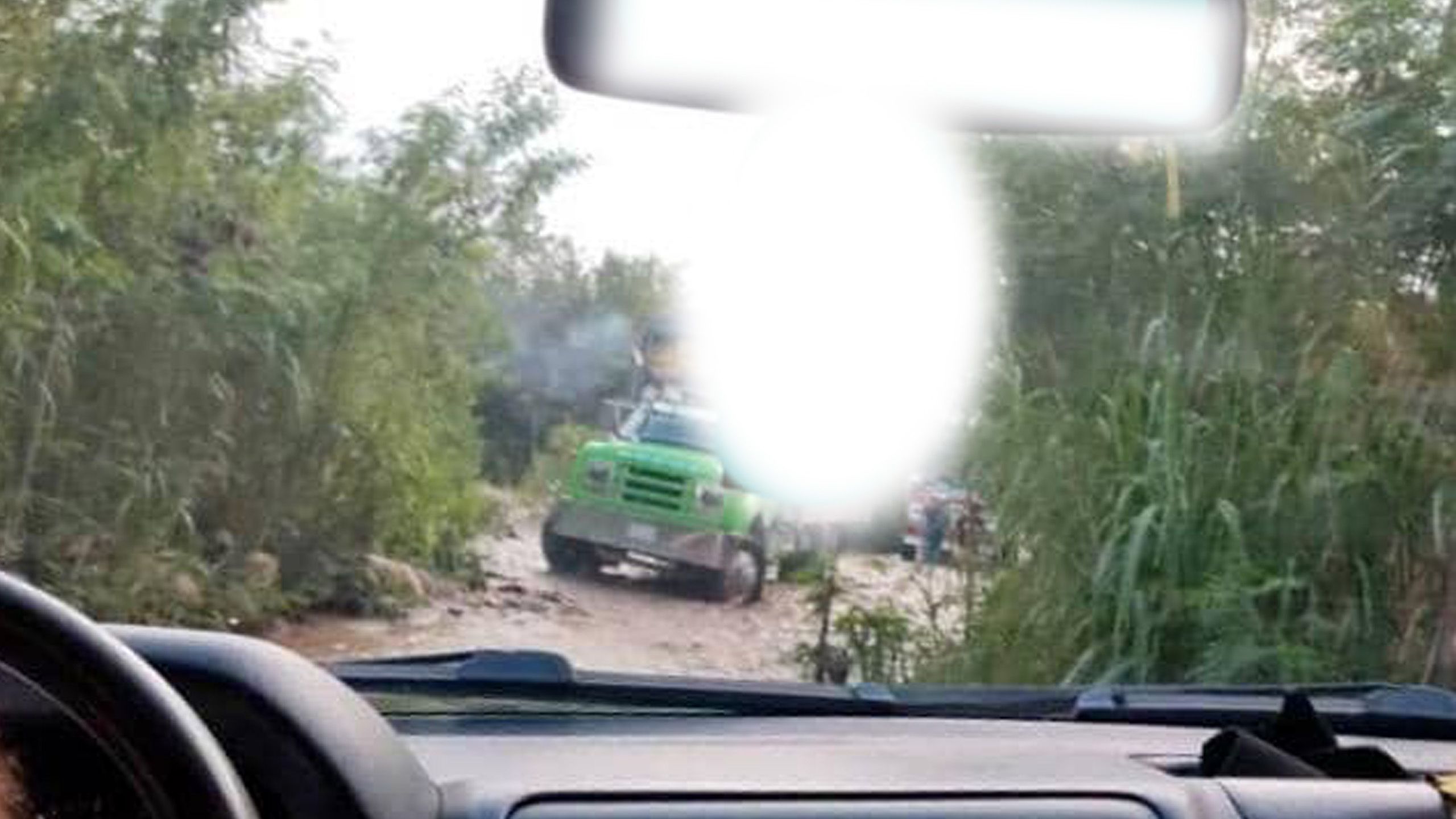
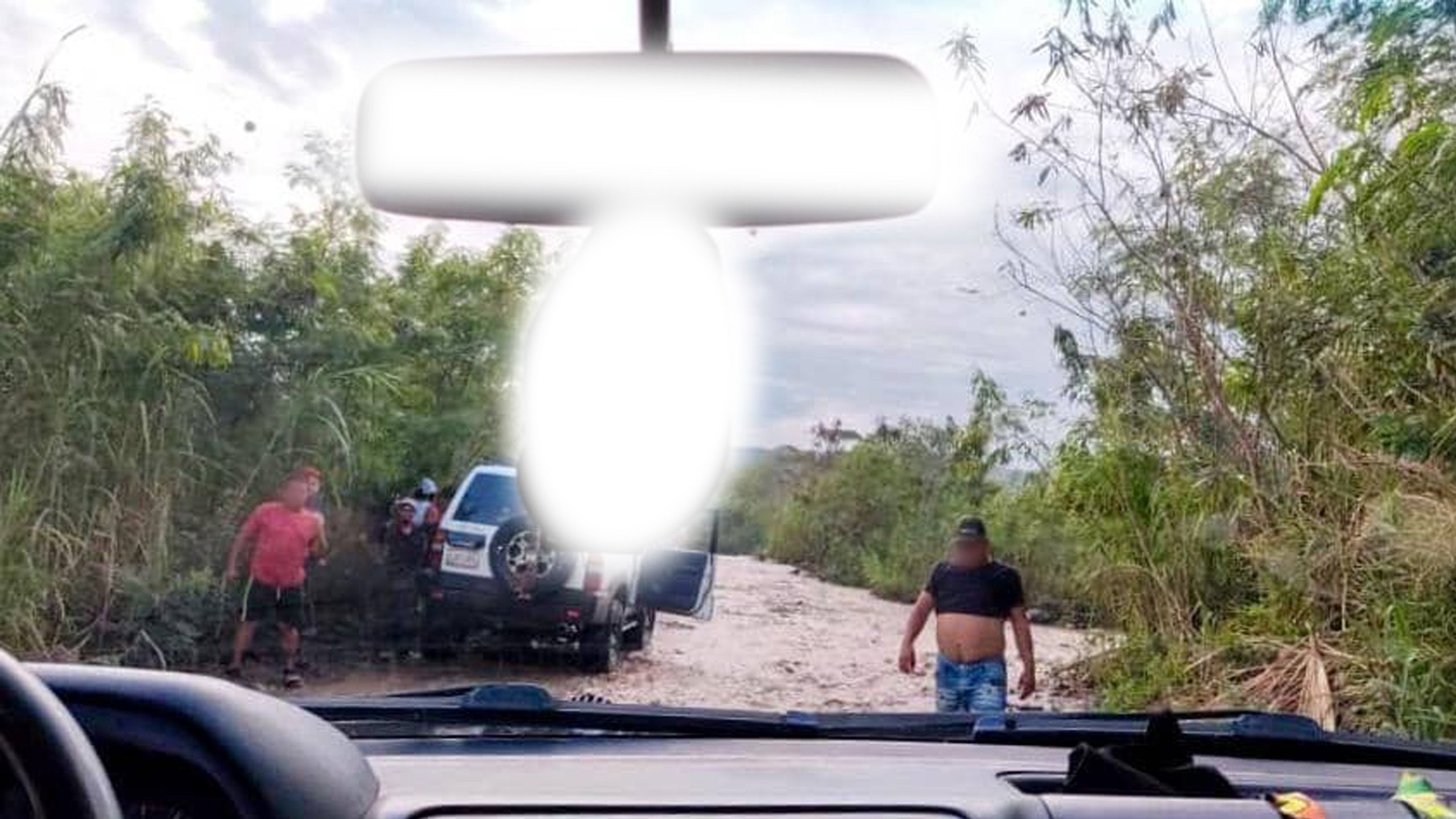



Irregular roads on the border tend to flood because they are near the Táchira River | ARI
Irregular roads on the border tend to flood because they are near the Táchira River | ARI
During the journey through the trail, in an area closer to Colombia we arrived at housing where was “Javier”, a soldier who was first contacted on the phone for this journey and who was paid for the rendered service. Then, the journey continued on another trunk to go “to the other side”.
The journey went on towards “La Ponderosa”, one of the speediest ways for illicit negotiations at the border area as the sources consulted for this report said. On arrival to the hacienda that adjoins the Colombian territory, a young soldier with a rifle let the vehicle in without inspections or questions. We got to an open-air parking lot where there were at least 50 high-end vans and freight cars guarded by men in plain clothes, carrying radio transmitters and wearing rubber boots.
“These vehicles are used to transship any goods at either side of the border”, assured the driver while another soldier from the Venezuelan army received in hand a roll of Colombian notes.
The governor has also pointed Bernal out for being the “main sponsor of coffee smuggling”, of fuel and domestic gas cylinders at the border as well as of participating in the irregular trade of scrap and ferrous material: the new export business of the Maduro administration. Nonetheless, Gómez has not reported him to the authorities because she states that it is difficult to show documents, given the complexity of the matter, the fear, and the wit of those involved for leaving no traces.
Despite the requests for interviewing two of Bernal’s press team members to know their opinion about these allegations against him, they did not reply.
The journey continued with no soldiers or police watching over, but civilians with unfriendly faces. From that point on, no one identified, all were called “buddy” or “dude”. They opened and closed the roads with fences, before paying 10.000 pesos. They also did the math of how much was owed from a previous trip that had not been paid yet. All those there were irregular ones.
On arrival to the Táchira riverbank, freight cars coming from Colombia were spotted, which found trailers with Venezuelan plates parked at the other side of the river, in the bushes. There, in the middle of the road, goods were transshipped.
This was the last thing witnessed in Venezuela; the end of the road watched over by men on motorcycles. After crossing the river, we arrived at a wide and magnificent rice crop in Colombia. Then, to another hacienda. Though the place seemed desolate, it was the Colombian village of Juan Frío, part of the municipality of Villa del Rosario in Norte de Santander department, an area where ELN guerrilla has a strong presence and has had clashes with the Colombian security forces, according to authorities in that country.
We took another vehicle there to go to Cúcuta, and to do so, an equivalent of 11 dollars, another 40.000 Colombian pesos, were paid. A new driver took the road that got off this trail and head to a small town. No Colombian soldier was seen during the journey. Nothing. The area seemed abandoned. A checkpoint from the Fiscals and Customs Police of Colombia was sighted in Villa del Rosario, where the officers checked the trunk and gave way “without any further”.
According to the type of goods, each person or retailer has a “protectorate’s code”.
Across the trails are moved food, medicine, spare parts, and detergents not complying with neither minimum health inspection nor quality.
The person holding a “protectorate’s code” must report an import trade in a Telegram group managed by Corpoandes. A picture of the vehicle transporting the goods must be sent to the group.
A person holding the “code” must send via a Telegram group for such purpose a picture of the receipt received in Colombia for the purchase of the goods authorized.
The Colombian trailers transporting goods through the trails are not the same vehicles taking them to the Táchira state and other parts of the country.
Upon reaching the trail on the Venezuelan side, a transshipment is carried out to cargo vehicles with Venezuelan registration, these operations are carried out in what is simulated as "customs yards".
On average, 200 freight cars move along the por las trails daily.
70% of the vehicles crossing the trails from Colombia to Venezuela are cars with a capacity of 35 tons or more because excess weight has been evidenced by the deterioration of the roads towards the border.
There are small trailers with a capacity of goods valued between 4.000 and 5.000 dollars.
And the trailers or freight cars arriving from the Colombian department of Norte de Santander to San Antonio del Táchira, transport goods worth between 8.000 and 20.000 dollars.
The goods legally entering the country generate valued-added tax (VAT) of between 16% to 32% per import; the 1% corresponds to the customs service fee.
With the “codes del protectorate” 3% is just paid to Treasury. Taken as a reference, the country does not collect 29% of the tax from a percentage higher than 32%.
Goods are declared on the condition of luggage, meaning that one declaring pairs of shoes is moving a trailer with wheat flour through the trail.
The luggage regime establishes that when one is traveling abroad can enter goods for personal use at a cost of up to 1.000 dollars that are exempted from tax payment.
Before the border was closed, there were 57 freight companies in Venezuela authorized by Customs; nowadays, seven remain.
They also had 120 customs agencies; now they have 30.
And from the 22 operational warehouses, none operates.
According to the sources consulted, members of the region’s productive trade associations such as the Asociación de Ganaderos del Táchira (Asogata) and Fedecámaras, get “protectorate’s code” to bring goods from Colombia to Venezuela.
There are business sectors from Norte de Santander that have requested Colombian president Iván Duque to close stop the goods issue through the trails. They assure that Colombia is unwilling to spread social and economic chaos as the borders provide for Norte de Santander and part of the Colombian east region.
According to the type of goods, each person or retailer has a “protectorate’s code”.
Across the trails are moved food, medicine, spare parts, and detergents not complying with neither minimum health inspection nor quality.
The person holding a “protectorate’s code” must report an import trade in a Telegram group managed by Corpoandes. A picture of the vehicle transporting the goods must be sent to the group.
A person holding the “code” must send via a Telegram group for such purpose a picture of the receipt received in Colombia for the purchase of the goods authorized.
The Colombian trailers transporting goods through the trails are not the same vehicles taking them to the Táchira state and other parts of the country.
Upon reaching the trail on the Venezuelan side, a transshipment is carried out to cargo vehicles with Venezuelan registration, these operations are carried out in what is simulated as "customs yards".
On average, 200 freight cars move along the por las trails daily.
70% of the vehicles crossing the trails from Colombia to Venezuela are cars with a capacity of 35 tons or more because excess weight has been evidenced by the deterioration of the roads towards the border.
There are small trailers with a capacity of goods valued between 4.000 and 5.000 dollars.
And the trailers or freight cars arriving from the Colombian department of Norte de Santander to San Antonio del Táchira, transport goods worth between 8.000 and 20.000 dollars.
The goods legally entering the country generate valued-added tax (VAT) of between 16% to 32% per import; the 1% corresponds to the customs service fee.
With the “codes del protectorate” 3% is just paid to Treasury. Taken as a reference, the country does not collect 29% of the tax from a percentage higher than 32%.
Goods are declared on the condition of luggage, meaning that one declaring pairs of shoes is moving a trailer with wheat flour through the trail.
The luggage regime establishes that when one is traveling abroad can enter goods for personal use at a cost of up to 1.000 dollars that are exempted from tax payment.
Before the border was closed, there were 57 freight companies in Venezuela authorized by Customs; nowadays, seven remain.
They also had 120 customs agencies; now they have 30.
And from the 22 operational warehouses, none operates.
According to the sources consulted, members of the region’s productive trade associations such as the Asociación de Ganaderos del Táchira (Asogata) and Fedecámaras, get “protectorate’s code” to bring goods from Colombia to Venezuela.
There are business sectors from Norte de Santander that have requested Colombian president Iván Duque to close stop the goods issue through the trails. They assure that Colombia is unwilling to spread social and economic chaos as the borders provide for Norte de Santander and part of the Colombian east region.
Madurista protection
As a “protector”, Bernal was in Táchira on Fridays, Saturdays, and Sundays only, but started going more often due to the electoral campaign to run for the governorship. On Fridays, he broadcasts his radio program, Reporte Bernal, which lasts for two hours and is conducted by his press officer, Yepfry Arguello, who self-identify as “the communications Afro-descendant” on his Twitter account.
“Bernal is a very powerful figure who has a great incidence on the state control. A different figure when talking about ´protectors´. In the case of Bernal, one can say he is a different thing”, stated Damián Alifa, Venezuelan political analyst.
The role of the “protectors” was strengthened from 2013 when Maduro, as acting president of the Republic, created the Corporación de Desarrollo Integral de la Cuenca del Tuy Francisco de Miranda (CorpoMiranda) and assigned then foreign minister Elías Jaua to run the agency. Then, he referred to him as a “protector” of Miranda. Barely three months before the dissident Henrique Capriles had been reelected as governor of that state.
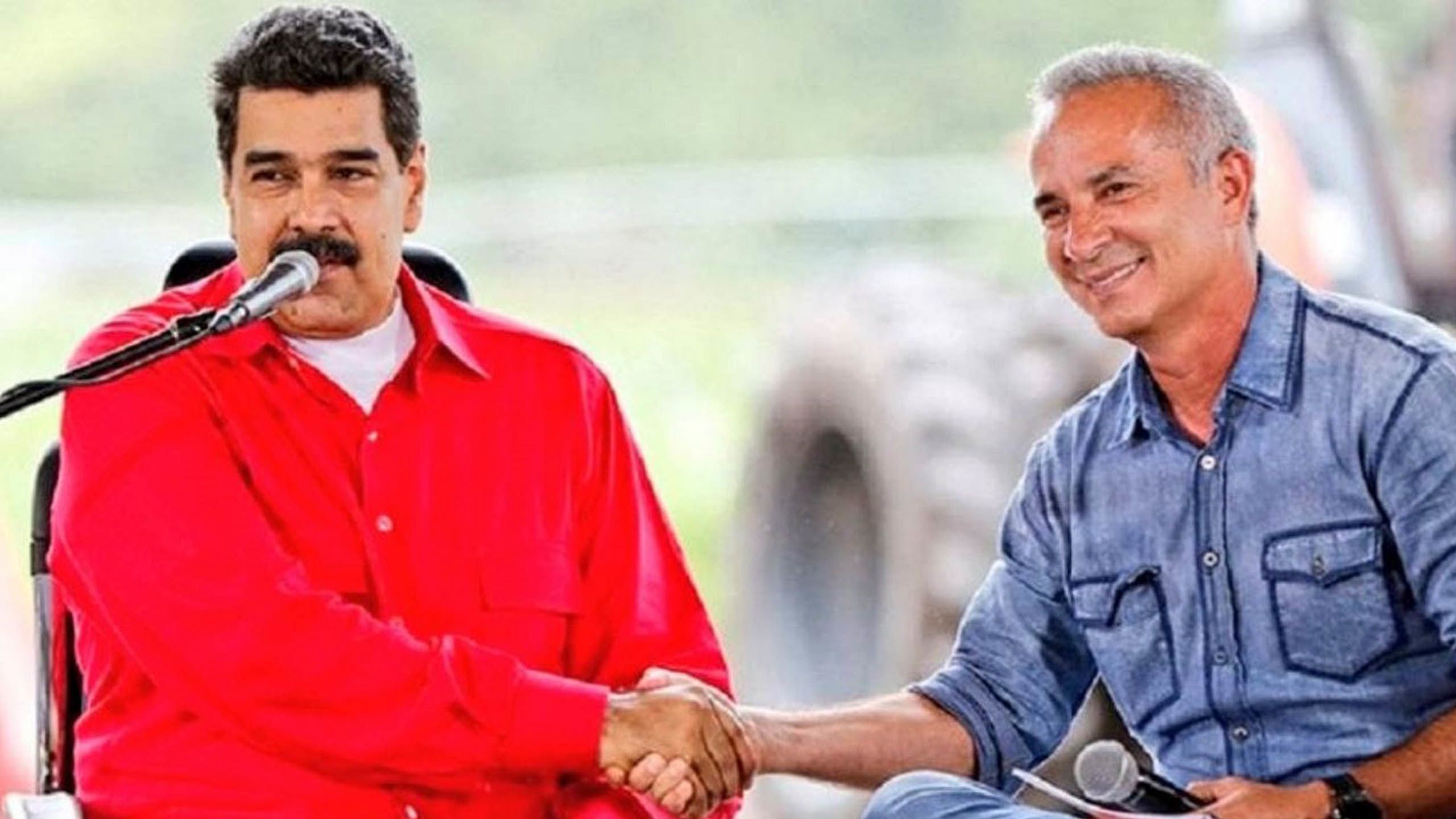
Maduro named Bernal political police commissioner Sebin before naming him Táchira “protector” | @PartidoPSUV
Maduro named Bernal political police commissioner Sebin before naming him Táchira “protector” | @PartidoPSUV
In 2017, Maduro named as “state protectors” the Chavism candidates that had lost that year the elections in four states: Anzoátegui, Mérida, Nueva Esparta, and Zulia. Long after, he assigned Freddy Bernal to Táchira. Analysts state that the border agency has always been “an internal nature issue” for Chavism now that is of dissident tendency. In 2014 and 2017 it was one of the toughest focal points of the protests.
Alifa stated the in Táchira “Bernal fitted because he is a police officer, control, violence management, intelligence roles for Chavism, and I think that that was considered to take the control of that state, which, for Chavism, is very complicated because there are many crossing points surrounded by all sort of things, irregular groups, different types of smuggling, from low to high scale ones”.
In his view, Bernal is close to the group of Diosdado Cabello, vice president of the PSUV official party, but has excellent relations with Cilia Flores, Maduro’s wife, and enjoys consensus among the ruling elite. It may be the reason why the following administration kept supporting him after he was a key figure in Hugo Chávez’s government.
“He has had a great incidence on the policing approach and the new public security schemes. Despite the government preferring a military to run the Ministry of Interior and Justice, he has had much influence on such new police concept that was created with the FAES (a group accused of violating human rights by Michelle Bachelet, the United Nations High Commissioner for Human Rights)”, mentioned Alifa.
How did the “protectors”
come about?

APRIL: The National Assembly dominated by Chavism drafted the Special Law for the Capital District which established a new government that was provided powers entitled to the Metropolitan district, or Mayor’s Office as it used to be called. It was laid out in this law that the authority of the Capital District is named by the President of the Republic, quite the contrary, the mayor is popularly elected.
The Constituent Assembly from 1998 approved the Law on the Special Regime of the Caracas Capital District which was observed while the elected metropolitan mayors were Chavist, but, when the dissident Antonio Ledezma was elected in 2008, the course of events changed.
Then, Hugo Chávez appointed former environment minister Jacqueline Faría as chief of the Capital District, a position that would manage a large share of the resources and powers held by mayor Antonio Ledezma to date.
MARCH: The role of the “protectors” appeared this year when Nicolás Maduro, as acting president of the Republic, assigned then foreign minister and vice president Elías Jaua as director of CorpoMiranda and referred to him as “protector” of the organization. These are due to the regional elections of 2012.
Jaua had lost elections for governor of Miranda state against dissident candidate Henrique Capriles and, days before his appointment, on March 19 specifically, the Executive created CorpoMiranda by decree; a measure published in the Official Gazette. In the document, the Corporación appears as a state-owned company with a start-up fund. That year, Jaua handles resources of up to 30% more than those allotted to the organization’s governance using additional credits allocation.
In this way, the central government affected the governance of the legitimately elected governor, Capriles in this case, because the resources were sent to the Corporación, whilst was enhanced as national government’s representative in the state, aiming at future regional elections.
DECEMBER: Maduro appointed former baseball player Antonio “el Potro” Álvarez as “protector” of Petare, the Parrish with the highest population density in Caracas’ Sucre municipality. Álvarez had been a mayor’s office candidate, but lost against dissident Carlos Ocariz, activist of Primero Justicia, same party of Henrique Capriles.
JULY: After strong days of protests, a constituent assembly that was not called by the people keeper of the primary constituent power was elected, as established by the Constitution, but by president Nicolás Maduro, who, as such, is part of the constituted powers.
OCTOBER: The constituent assembly called for regional elections in which the official party achieved 18 of the 23 governorships in the country.
Nine days later, Maduro appointed “state protectors” for four of the states where Chavism lost: Anzoátegui, Mérida, Nueva Esparta and Zulia, being them Francisco Arias Cárdenas, who was the defeated candidate in Zulia, Jehyson Guzmán, who as defeated in Mérida, Aristóbulo Istúriz in Anzoátegui and Carlos Mata Figueroa in Nueva Esparta.
In this opportunity, the role was not needed in Miranda, Carlos Ocariz, governorship’s candidate, lost against Héctor Rodríguez, an official candidate who took direct control CorpoMiranda.
JANUARY: Maduro appointed a Chavism leader who was very close to Chávez and already held another trust in his predecessor’s government: Freddy Bernal.
JUNE: Nicolás Maduro promised to eliminate the role of the “protectors” after the governorship and mayors’ offices elections on 21. As he said, the topic was discussed at the negotiation table with the opposition in Mexico.
AUGUST: Two months after his commitment to eliminate the “protector” role, Nicolás Maduro shows regrets on this decision.
On the list
Several governments have spotted some suspicious actions and have taken actions against Bernal. In 2011, the Office of Active Assets Control (OFAC) included him on the Clinton list or Kingpin for having “enabled the sale of weapons between the Venezuelan government and FARC”, categorized as a terrorist group by the American government.
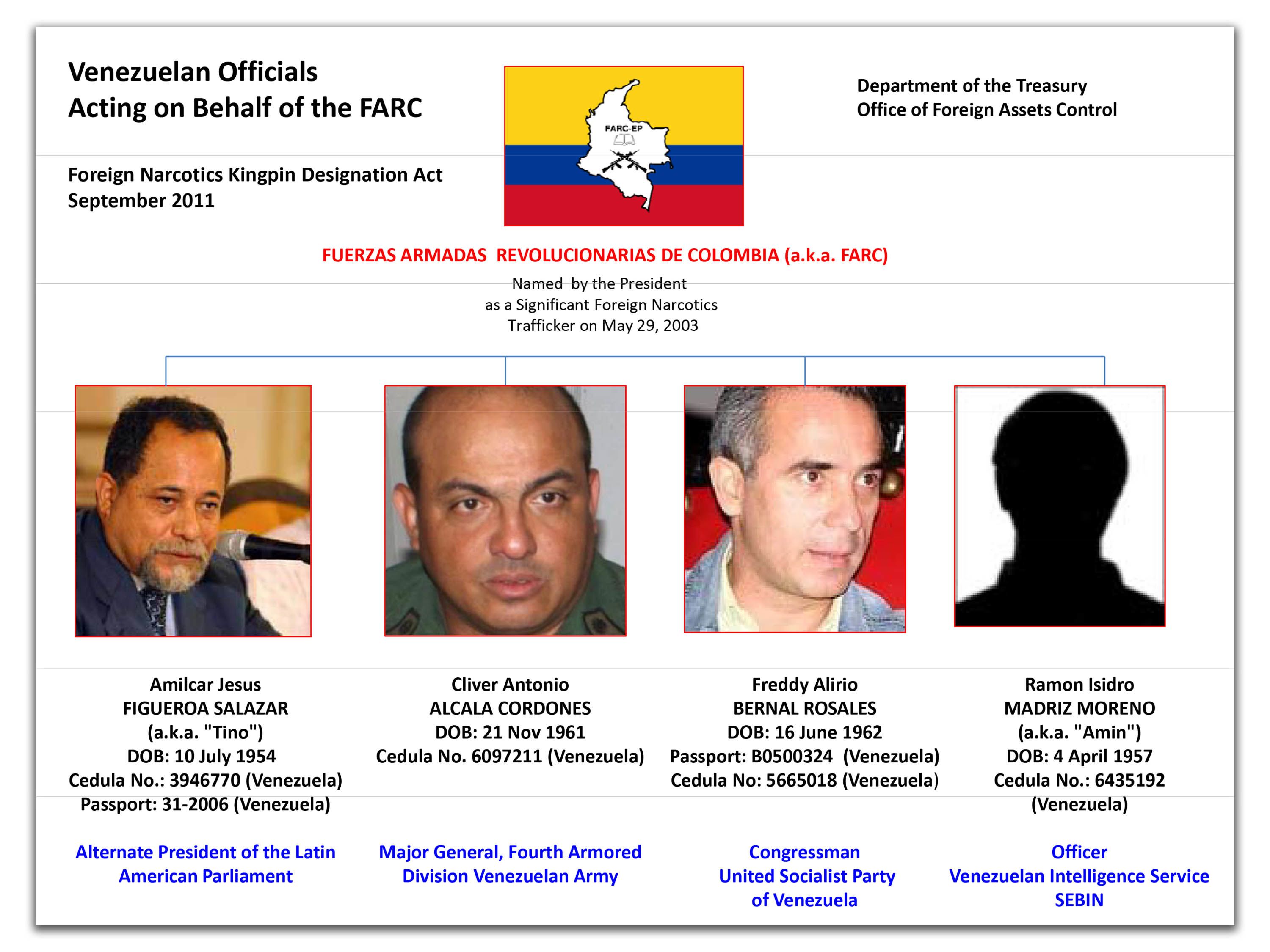
Also included on the list Cliver Alcalá Cordones, currently imprisoned in the US and also awaiting trial for drug trafficking. Besides, then deputy Amílcar Figueroa Salazar and chief of the political police Sebin, Ramón Madriz Moreno are also on the list.
Bernal belongs to other lists as well: one of the Chavism officers sanctioned by the American Department of Treasury, Canada, the European Union, Panama, United Kingdom, and Switzerland. There’s still more. The former foreign minister of Colombia, Carlos Holmes Trujillo, denounced him as being the strategic link of the Venezuelan regime to ‘Lenin’, member of the ELN’s Guerra Oriental Front, at the Organization of American States (OAS).
#11Sep El canciller de Colombia, Carlos Holmes Trujillo acusó al llamado "protector del Táchira" y líder nacional de los colectivos, Freddy Bernal, de ser el enlace que existe entre el régimen venezolano y los grupos terroristas como las FARC y ELN. pic.twitter.com/bUNr06bQA8
— VPItv (@VPITV) September 11, 2019
Within the Partido Socialista Unido de Venezuela (PSUV), Bernal has been questioned for displacing the regional Chavista leaders by taking all his work team from the capital of the country, including officials members of the criticized FAES (Fuerzas de Acciones Especiales) security forces.
In his administration, he created an internal structure formed by the three areas from which the guidelines followed in the region are developed: Protectorate, PSUV, and Security. He also created several government offices that carry out given tasks: fuel, gas, transport, food, health, mining and international relations, special economic areas, security communications, university, communes, and digital economy. Each of them is controlled by a person that Bernal fully trusts.
A PSUV activist said for this report that the discomfort of the “protectorate” team raised when the top government-supported Bernal to the primary elections for electing the candidate for Táchira governorship in August 2021. He turned out to be the winner in a process that the pro-government themselves criticized when they identify irregularities such as opportunism, vote-buying, and manipulation of machines to change voting.
Though the now candidate for governor was born in this Andean region, he did not live there. His family -mother’s and father’s– lives in a popular district in the Tachiran capital city, San Cristóbal. The neighbors know when he pays a visit to them because of the heavy security presence.
“I know what to expect if I get caught. I move around armed, and they come with me -he says pointing at the group of armed officers that escort him-, I would not abandon them, and they would not abandon me. If they would take me, there would be a massacre because we would go all the way”, Bernal himself is quoted in an interview for the América Latina en Movimiento website in 2020 about the security staff that goes everywhere with him.
Silfredo Gregorio Zambrano: Corpoandes president. He arrived in Táchira with Freddy Bernal, he was not known in this state and was more related to Mérida. Fully trusted man of the “protector”. He was a civil servant but not a recognized official.
Now he is a candidate of the PSUV to San Cristóbal’s mayor’s office, which has never been won by Chavism. He went to primary elections together with Bernal and won. An unknown person until a year ago and whom Bernal promotes in his radio program when mentioning Corpoandes.
Jeffrey Rodríguez: Comissioner. Member of the Dirección de Inteligencia y Estrategia (DIE), police organization fully trusted by Freddy Bernal, and which stems from Fuerzas de Acciones Especiales (FAES).
Little known before arriving in Táchira. He identifies himself on Twitter as “Bolivarian, revolutionary and radical Chavist”. Less public man, but comes out to be the police arm of the national government’s representative in Táchira.
José Bermúdez: Food Office Coordinator. Policeman from Caracas.
Jiuvant Huérfano: is the equivalent of the government’s general secretary in the “protectorate”. Political scientist. Main political operator. He produces such called “operational orders” from the PSUV Táchira political bureau.
He arrived from Caracas with the “protector”. His second in command is Zoraida Parra, a long-time regional leader in Táchira. Manages Freddy Bernal’s Táchira governorship’s campaign headquarters.
Ángel Moronta Juliao: Lieutenant general, Zodi commander, and member of the Fuel Office.
José Leonardo Rosales Aleta: Coordinator of the State’s Protectorate Transport Office and president of TransTáchira. National Assembly deputy.
The Transport Office manages the fleet of “red buses”, as TransTáchira ones are known. He is a cousin of Freddy Bernal Rosales. Before the “protector” arrived in Táchira, he was not recognized as a regional first-line leader.
Yepfri Arguello: Coordinator of the Communications, Telecommunications, and Culture Office. He was raised by the so-called CLAP communicators in Caracas. He calls himself the “communications Afro-descendant”. He arrived to Táchira from Caracas with Freddy Bernal.
Regional deputy candidate for circuit number 3, productive area. He stepped over local and regional leadership. He defines himself on Instagram as a “journalist, dreamer, Afro-descendant, defender of truth, and one who fights for a world full of equality”.
Amelia Fressel: Coordinator of the Health Office. Doctor and colonel of the National Guard. At the same time, she manages the Unique Health Authority. She runs everything related to covid-19, the vaccines, and supplies for Táchira’s public network.
She is the director of the Hospital Oncológico del Táchira, affiliated to the Ministry of Health according to the Official Gazette Nb. 40.588, but as Unique Authority, she manages public health depending from the state’s health ministry’s office.
José Rafael Belisario: President of Gas Táchira. Sources consulted said that domestic gas cylinders supply distribution has improved since his administration allowed selling the product in Bolivars and Colombian pesos.
Lawyer. An unknown civil servant from Táchira’s public arena, and since Freddy Bernal’s arrival, he has had other positions.
Nellyver Lugo: a member of the Fuel Office. Táchira’s Legislative Council’s deputy.
Defferson González: Pdvsa regional director regional and member of the Fuel Office.
Charly Marina Rojas: Coordinator of the Social Office. She replaced policeman Rodolfo Suárez, who was Bernal’s one of the most trusted ones until he deceased.
Carlos Trómpiz: Coordinator of the Mining and International Relations. A policeman from Caracas.
Natalia Chacón: Coordinator from the Communes and Popular Power Office. Mayor from the Lobatera’s municipality.
Keyla Hernández: Coordinator of the University Office. National Assembly deputy.
Martha Gallo: Member of the Public Policies Control and Follow-up Center.
Eduardo Sánchez: Director of Comditaca, a company affiliated to Corpoandes that oversees the trading and distribution rights of the liquified petroleum gas in Táchira; concession received from Pdvsa in September 2019.
He manages the Strategic Material Recycling Center in the region.
Joshua Faratro: manages La Fría Industrial Area Reactivation Commission.
Carlos Tovar: Coordinator of the Culture Office.
Javier Flores: Venezuelan international liason to the United Nations (UN). President of San Cristóbal’s Municipal Council.
Silfredo Gregorio Zambrano: Corpoandes president. He arrived in Táchira with Freddy Bernal, he was not known in this state and was more related to Mérida. Fully trusted man of the “protector”. He was a civil servant but not a recognized official.
Now he is a candidate of the PSUV to San Cristóbal’s mayor’s office, which has never been won by Chavism. He went to primary elections together with Bernal and won. An unknown person until a year ago and whom Bernal promotes in his radio program when mentioning Corpoandes.
Jeffrey Rodríguez: Comissioner. Member of the Dirección de Inteligencia y Estrategia (DIE), police organization fully trusted by Freddy Bernal, and which stems from Fuerzas de Acciones Especiales (FAES).
Little known before arriving in Táchira. He identifies himself on Twitter as “Bolivarian, revolutionary and radical Chavist”. Less public man, but comes out to be the police arm of the national government’s representative in Táchira.
José Bermúdez: Food Office Coordinator. Policeman from Caracas.
Jiuvant Huérfano: is the equivalent of the government’s general secretary in the “protectorate”. Political scientist. Main political operator. He produces such called “operational orders” from the PSUV Táchira political bureau.
He arrived from Caracas with the “protector”. His second in command is Zoraida Parra, a long-time regional leader in Táchira. Manages Freddy Bernal’s Táchira governorship’s campaign headquarters.
Ángel Moronta Juliao: Lieutenant general, Zodi commander, and member of the Fuel Office.
José Leonardo Rosales Aleta: Coordinator of the State’s Protectorate Transport Office and president of TransTáchira. National Assembly deputy.
The Transport Office manages the fleet of “red buses”, as TransTáchira ones are known. He is a cousin of Freddy Bernal Rosales. Before the “protector” arrived in Táchira, he was not recognized as a regional first-line leader.
Yepfri Arguello: Coordinator of the Communications, Telecommunications, and Culture Office. He was raised by the so-called CLAP communicators in Caracas. He calls himself the “communications Afro-descendant”. He arrived to Táchira from Caracas with Freddy Bernal.
Regional deputy candidate for circuit number 3, productive area. He stepped over local and regional leadership. He defines himself on Instagram as a “journalist, dreamer, Afro-descendant, defender of truth, and one who fights for a world full of equality”.
Amelia Fressel: Coordinator of the Health Office. Doctor and colonel of the National Guard. At the same time, she manages the Unique Health Authority. She runs everything related to covid-19, the vaccines, and supplies for Táchira’s public network.
She is the director of the Hospital Oncológico del Táchira, affiliated to the Ministry of Health according to the Official Gazette Nb. 40.588, but as Unique Authority, she manages public health depending from the state’s health ministry’s office.
José Rafael Belisario: President of Gas Táchira. Sources consulted said that domestic gas cylinders supply distribution has improved since his administration allowed selling the product in Bolivars and Colombian pesos.
Lawyer. An unknown civil servant from Táchira’s public arena, and since Freddy Bernal’s arrival, he has had other positions.
Nellyver Lugo: a member of the Fuel Office. Táchira’s Legislative Council’s deputy.
Defferson González: Pdvsa regional director regional and member of the Fuel Office.
Charly Marina Rojas: Coordinator of the Social Office. She replaced policeman Rodolfo Suárez, who was Bernal’s one of the most trusted ones until he deceased.
Carlos Trómpiz: Coordinator of the Mining and International Relations. A policeman from Caracas.
Natalia Chacón: Coordinator from the Communes and Popular Power Office. Mayor from the Lobatera’s municipality.
Keyla Hernández: Coordinator of the University Office. National Assembly deputy.
Martha Gallo: Member of the Public Policies Control and Follow-up Center.
Eduardo Sánchez: Director of Comditaca, a company affiliated to Corpoandes that oversees the trading and distribution rights of the liquified petroleum gas in Táchira; concession received from Pdvsa in September 2019.
He manages the Strategic Material Recycling Center in the region.
Joshua Faratro: manages La Fría Industrial Area Reactivation Commission.
Carlos Tovar: Coordinator of the Culture Office.
Javier Flores: Venezuelan international liason to the United Nations (UN). President of San Cristóbal’s Municipal Council.
Revolutionary policeman
Freddy Bernal added that since he was very young, he empathized with “the revolution” led by the representatives of the left-wing in the region during his interview in América Latina en Movimiento. This was something not seen to be wrong while he was studying at the Escuela de Formación de Oficiales de la Guardia Nacional and then at the Escuela de Formación de Policías, where he graduated in Police Science, with a distinction in Security Systems.
“It was prohibited to talk about the left (at the academy) and, obviously, about the revolution. Nonetheless, I was intuitively reading Khadafi’s Green Book, the books from Che or History will Absolve Me from Fidel Castro. They looked at me with suspicion and were about to throw me out a month before the graduation even though I was the best student in the course”, he said.
From his experience as a bodyguard for Nicaragua’s president, Violeta de Chamorro, he said that he had “fallen in love” with the Sandinista revolution and had finally understood “which side I should take”. He was assigned to this mission by Carlos Andrés Pérez’s government itself, and to which Chávez gave a coup d’état 1992.
He oversaw the Comando Especial Táctico de Apoyo (the fearsome CETA group), questioned for its irregular operations, and for one of the groups who participated in the following coup attempt led by Chávez on November 27, 1992. “I participated in special operations, with snippers, a complicated situation for me”.
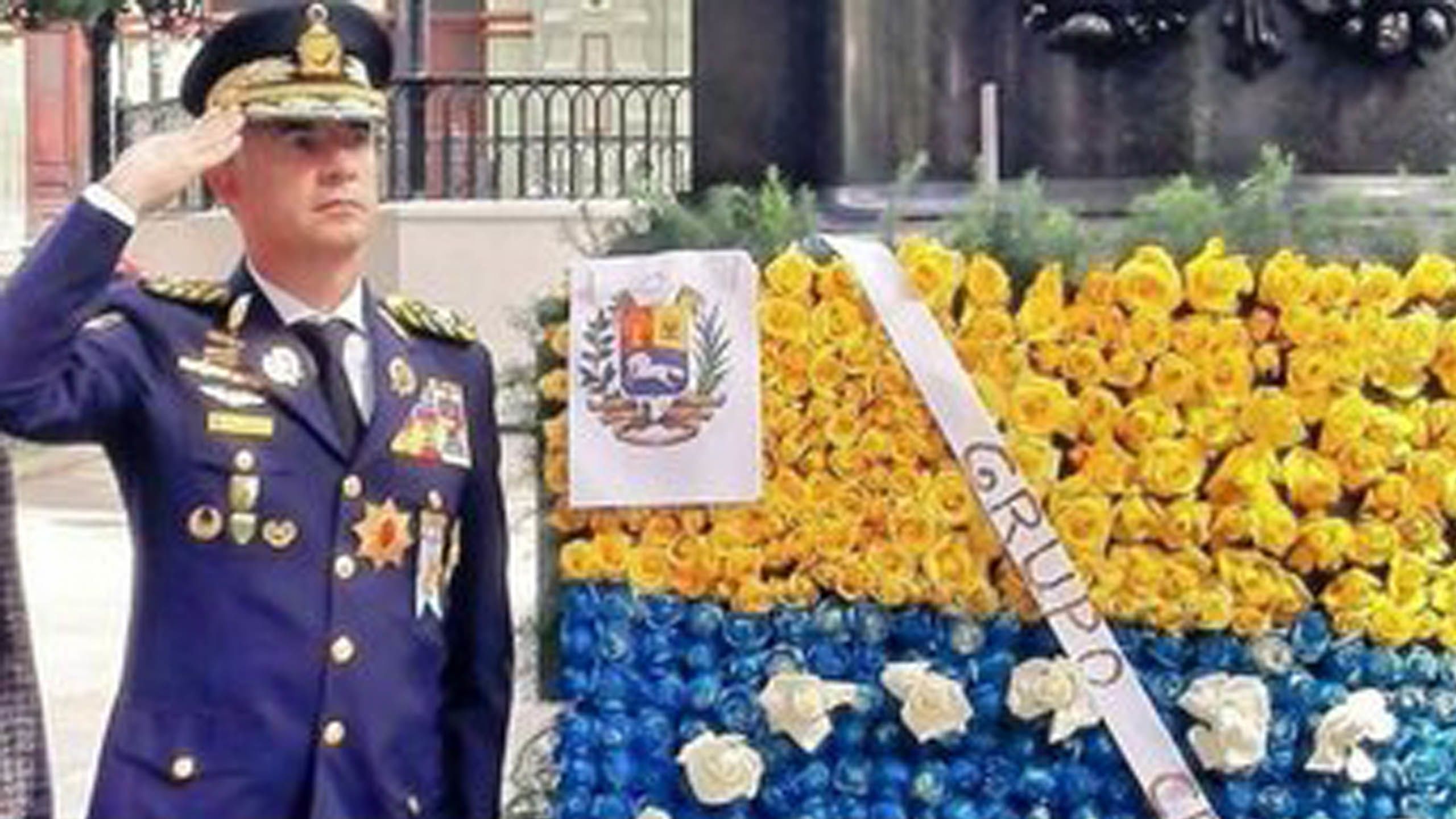
Bernal participates in public acts with the police full-dress uniform | Twitter @FreddyBernal
Bernal participates in public acts with the police full-dress uniform | Twitter @FreddyBernal
After participating in the coup, Bernal consolidated his membership in the Chavism and earned a position in Chávez’s team, after convincing him to work in the Bolivarian circles. “He asked me to train them to take power”. These groups were created to promote the “Bolivarian revolution”, but they became the main attackers of the opposition supporters during their anti-government demonstrations.
Years later, in 2017, he was assigned as general commissioner for the Servicio Bolivariano de Inteligencia Nacional (Sebin), another of the security agencies from the government that Bachelet’s office made responsible for human rights violations in 2020.
Despite all the political positions he has had over these 20 years, Bernal still likes to wear his police full-dress uniform for official acts, and especially one of the security corps that Chavism militarily intervene in and later abolished for being managed by the local opposite government: the Metropolitan Police. In his public presentation he also feels comfortable by being surrounded by his most trusted bodyguards; a reason why he is called the “protector, protected”.
Now in the campaign, the social media promotion is frequent eating “buñuelos de yuca” at city markets. Last October 4 he posted on Twitter photos of him at the removal of the containers placed by the same government in 2019 on the Simón Bolívar international bridge when the border was closed to prevent humanitarian aid to enter the country. This was a way to show his control of the area. He has also participated in activities proper from a governor even when he is not in that position.
In a decision causing surprise, Maduro announced that after the regional elections coming November, the “protector” role will be abolished. As Freddy Bernal will have the opportunity to be measured at poles, he might legally exercise as a regional leader in the border state but would start his administration in the shade of allegations against him.
CREDITS
